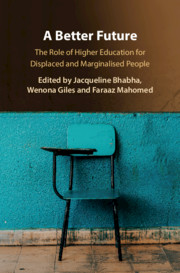Book contents
- A Better Future
- A Better Future
- Copyright page
- Contents
- Figures
- Tables
- Notes on Contributors
- Introduction
- Part I Encountering Marginalisation
- Part II Deconstructing Marginalisation
- Chapter 8 Providing Access to Higher Education for Refugees in Europe
- Chapter 9 The German Case
- Chapter 10 Colombian Distress Migrants in Ecuador
- Chapter 11 Transcending Socio-cultural Barriers
- Chapter 12 Combating the Exclusion and Marginalisation of Persons with Intellectual Disabilities in Higher Education in the United States
- Chapter 13 ‘Invisible’ Disabilities in South Africa’s Higher Education Sector
- Part III Confronting Marginalisation
- Index
- References
Chapter 10 - Colombian Distress Migrants in Ecuador
Limits to Higher Education
from Part II - Deconstructing Marginalisation
Published online by Cambridge University Press: 06 September 2020
- A Better Future
- A Better Future
- Copyright page
- Contents
- Figures
- Tables
- Notes on Contributors
- Introduction
- Part I Encountering Marginalisation
- Part II Deconstructing Marginalisation
- Chapter 8 Providing Access to Higher Education for Refugees in Europe
- Chapter 9 The German Case
- Chapter 10 Colombian Distress Migrants in Ecuador
- Chapter 11 Transcending Socio-cultural Barriers
- Chapter 12 Combating the Exclusion and Marginalisation of Persons with Intellectual Disabilities in Higher Education in the United States
- Chapter 13 ‘Invisible’ Disabilities in South Africa’s Higher Education Sector
- Part III Confronting Marginalisation
- Index
- References
Summary
Ecuador has a progressive approach to the social inclusion of migrants, which serves as a powerful counter-example to current global trends of social exclusion of these populations. But despite constitutional guarantees of free higher education, and legal commitments to equality in access, enormous gaps remain between policy and practice. Estimates suggest that the rate of access to university education for refugees in Ecuador is 2.5 per cent, less than a tenth of the national average, which is 36 per cent. This chapter will explore why this progressive vision falls short, and the implications for those seeking to democratise access to higher education in Ecuador. Access to higher education is largely defined through civil employees’ inflexible everyday interpretations of national legal frameworks. Issues of ownership of identity documents, migration status and documentation of education achievement are relevant, and pervasive social discrimination and poverty all have a profound impact on refugee’s ability to gain entry into universities. This chapter will explore how the label of ‘refugee’ is both employed and discarded by displaced youth and the bureaucratic state in the context of higher education access.
- Type
- Chapter
- Information
- A Better FutureThe Role of Higher Education for Displaced and Marginalised People, pp. 223 - 244Publisher: Cambridge University PressPrint publication year: 2020
References
- 1
- Cited by

